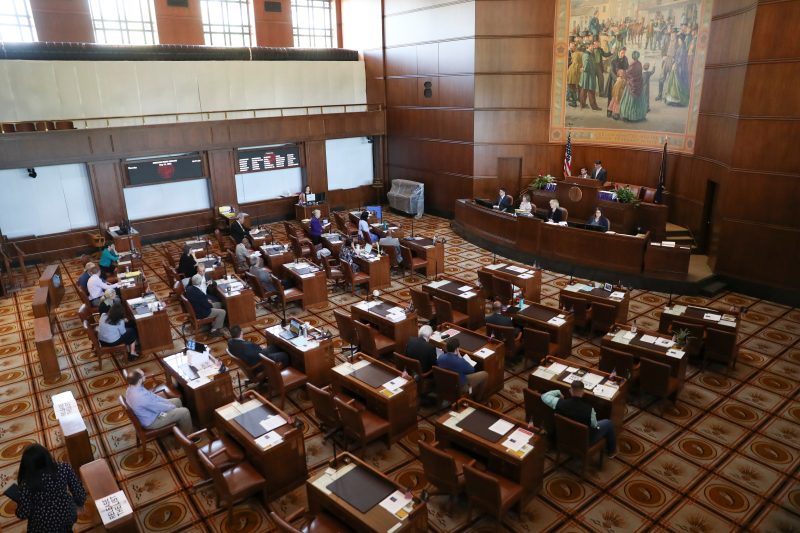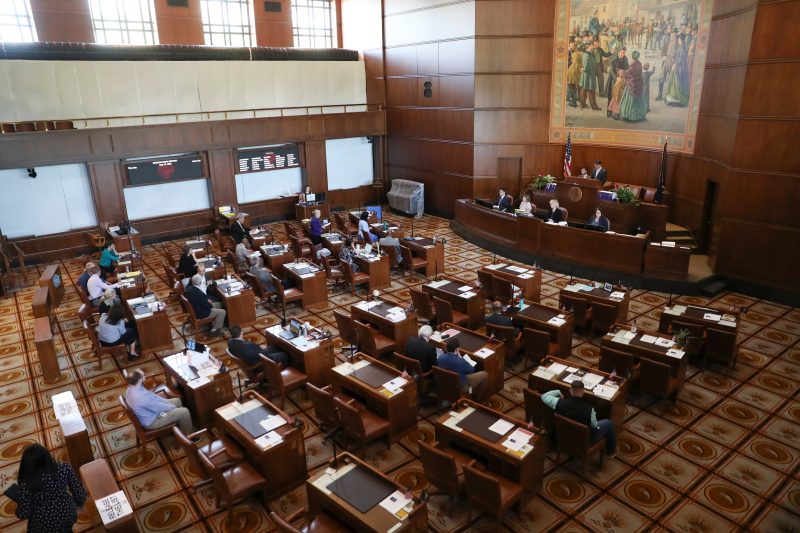

The Oregon Supreme Court on Thursday barred 10 Republican state senators from seeking reelection after a record-long walkout from the legislature last year spurred by objections to a measure intended to protect abortion rights and gender-affirming health care.
Oregon voters approved a constitutional amendment in 2022 that disqualified legislators with 10 or more unexcused absences during a legislative session from holding office in the subsequent term. The measure was aimed at preventing future boycotts amid an increasing frequency of legislative walkouts in the state.
The 10 Republican state senators who took part in a six-week walkout last year prevented the Oregon Senate from reaching a two-thirds quorum required in the chamber to conduct business.
Thursday’s court ruling upholds Oregon Secretary of State LaVonne Griffin-Valade’s decision to disqualify the GOP state senators involved in the walkout from being on the ballot based on the amendment.
The plaintiffs in the case, five state senators suing over Griffin-Valade’s decision, were among the 10 senators who accrued more than 10 absences.
The measure approved in 2022 states that “failure to attend, without permission or excuse, ten or more legislative floor sessions called to transact business during a regular or special legislative session shall be deemed disorderly behavior and shall disqualify the member from holding office as a Senator or Representative for the term following the election after the member’s current term is completed.”
The plaintiffs in the case disputed when the penalty barring them from holding office would kick in, arguing that an “election after the member’s current term is completed” could be interpreted as allowing a legislator to pursue reelection before their current term had ended, thus allowing them to serve one additional term before being disqualified from holding office.
The court said in its opinion that while the “petitioners’ interpretation of the text may be the more grammatical reading, the text is capable of supporting the secretary’s interpretation,” noting that “voters would have understood the disqualification to apply to the term of office immediately following the term in which a legislator accrued 10 or more unexcused absences.”
After the court’s ruling, Griffin-Valade said in a statement: “I’ve said from the beginning my intention was to support the will of the voters. It was clear to me that voters intended for legislators with a certain number of absences in a legislative session to be immediately disqualified from seeking reelection. I’m thankful to the Oregon Supreme Court for providing clarity on how to implement Measure 113.”
The court’s decision has electoral consequences, effectively ending the reelection prospects of 10 Republican state lawmakers who represent one-third of the Oregon Senate.
Oregon Senate Republican Minority Leader Tim Knopp, who led the boycott, said in a statement: “We obviously disagree with the Supreme Court’s ruling. But more importantly, we are deeply disturbed by the chilling impact this decision will have to crush dissent.”
Another plaintiff in the group, state Sen. Daniel Bonham (R), said in a statement: “Every legal mind I’ve heard from regardless of political leanings has affirmed that when there is only one interpretation for the plain language of the law, that is final. The language incorporated into the Oregon Constitution was clear and yet the Supreme Court ruled that voter intent, which cannot be determined by any metric, supersedes the Constitution. There is no justice in a political court.”
The court decision comes ahead of a 35-day legislative session set for this month, with a bill aimed at the expansion of the state’s housing supply a key priority for Oregon Gov. Tina Kotek (D). Kotek’s effort to pass a similar proposal last year met resistance from some Democrats in the state legislature, and it ultimately failed amid the Senate Republicans’ walkout, which halted legislative action in the chamber.

